In my previous article, I discussed the best pre- and post-workout meals for high intensity sports like Muay Thai Kickboxing. However, when it comes to fight nutrition specifically, pre-fight nerves mess up the regular guidelines. In this article, I discuss everything fighters need to know about eating before a fight.
The best pre-fight nutrition includes the following ingredients:
- Red beets, pomegranate juice, and pumpkin seeds for blood flow improving nitrates
- Leafy greens and algae for oxygenating chlorophyll
- Fruits for a light pre-fight snack
- A foundation of complex carbs and protein, e.g. oatmeal + eggs
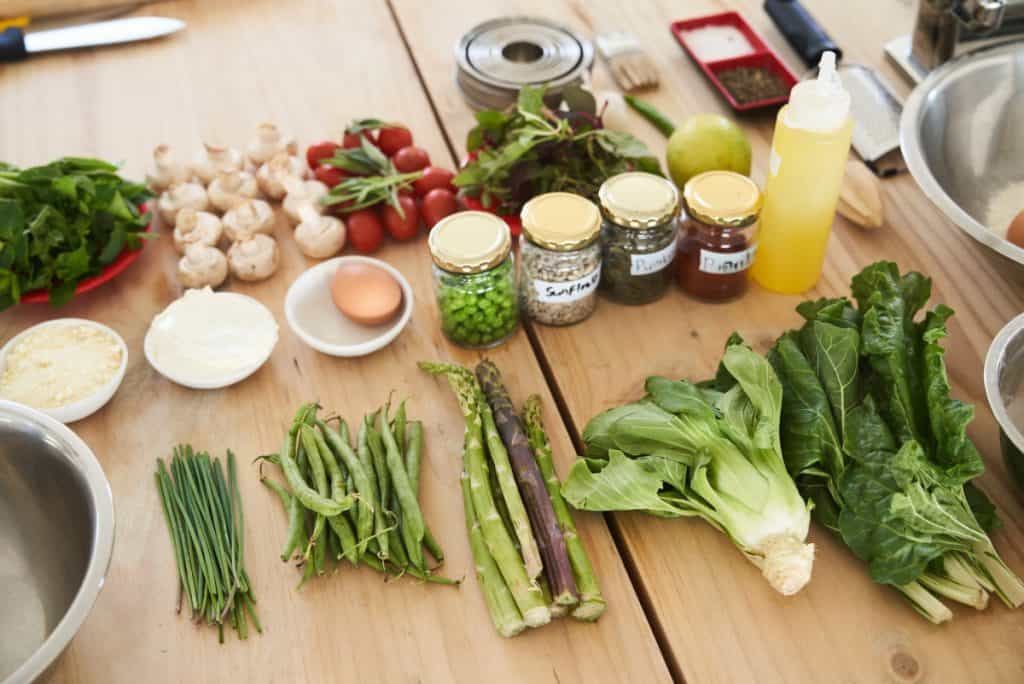
Keep in mind that pre-fight nerves will influence your digestion, which means that it’ll take longer than usual to metabolize your food. Moreover, as weird as it may sound, there’s also an argument to be made for not eating before your fight at all. And that’s regardless of the energizing effects of pre-fight nutrition! Read on to find out how exactly pre-fight nutrition is different from a regular pre-workout meal.
Do kickboxers eat before a fight?
Yes, since kickboxers weigh in in the morning or the day before the fight, most fighters eat and drink right after weighing in. They fuel themselves with carbohydrates for energy, and replenish the fluids and minerals lost from cutting weight to prepare their body for performing at peak levels.
Yet, there are also fighters who do replenish their fluids and minerals, but don’t eat any food before their fight. This is because a kickboxing match is not just a fight against your opponent, it is also a fight with yourself – the willpower you need to deal with the stress, emotions, and fatigue. When going into such a battle, some fighters prefer to be hungry (or “hangry”) because it gives them an extra edge – an edge where it feels that their life is at stake, which helps to tap into their primal instincts.
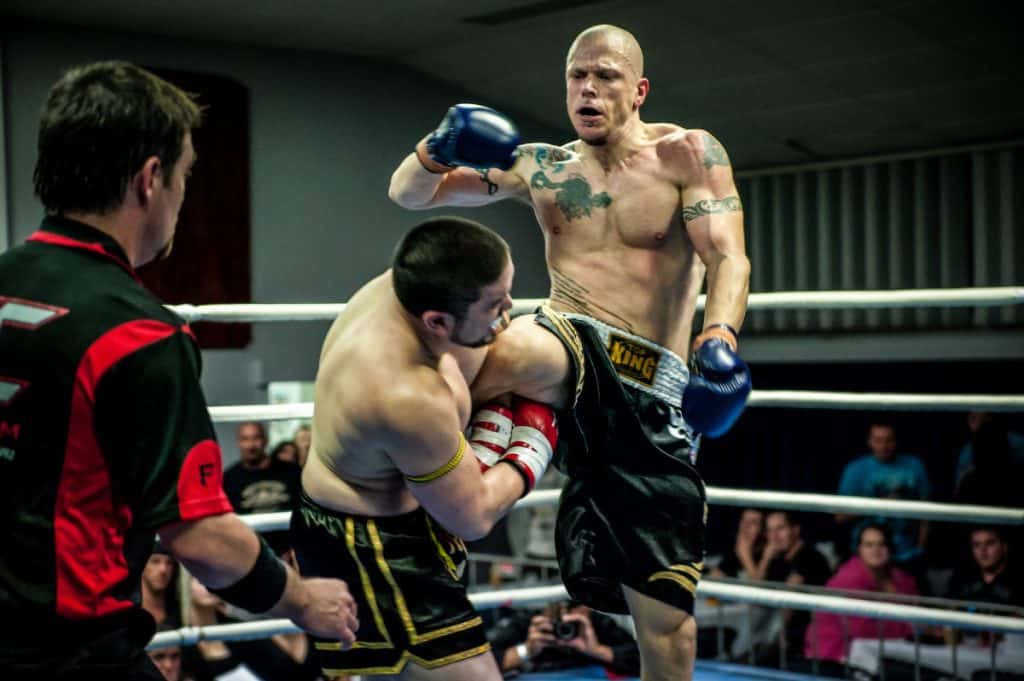
MMA fighter Cat Zingano famously explained on the Joe Rogan Experience podcast that fighting plays into her primal instincts. Particularly, when she won a hard fight, she explains that the “relief” was there because “we lived… we get to eat.” It’s about getting to “know” herself by “know[ing] what would have happened” if she would be “fighting over territory or food” – in other words, “who gets the bone.”
So, while eating the right foods can give you the nutritional fuel for optimum athletic performance, this does not necessarily ensure an optimum fighting performance. The latter is a personal preference that varies from fighter to fighter, and from day to day.
What food gives you the most energy?
- Quick energy: fruits like bananas, apples, and strawberries
- Long energy: complex carb foods like sweet potato, brown rice, and wholegrain pasta, quinoa, or oats
- Energy boosting compounds: coffee, guaraná, cacao, tea, cordyceps mushrooms, red beets, pomegranates, and algae like chlorella/spirulina
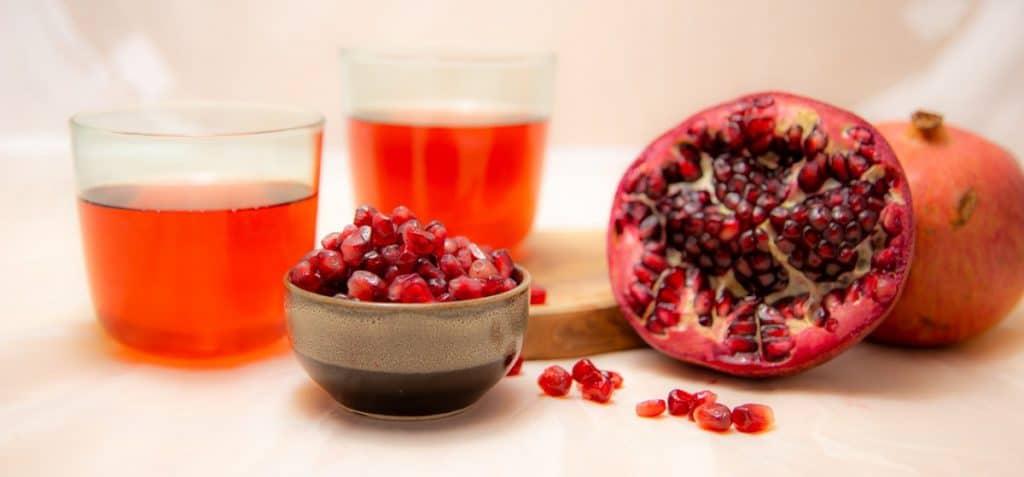
In addition to foods, there are various supplements that boost your energy levels as well. However, since supplements come in various shapes, forms, and pricings – and can sometimes even be dangerous if used wrongly – I’ll dedicate another blog to explaining which ones are suitable for fighting and how you use them best. Are you healthy and too impatient to wait? Have a look at Cordyceps extract and Beta-alanine.
How many hours should you eat before your competition?
Because of pre-fight nerves, your digestion will take longer than you’re used to. So, take small bites and eat slowly:
- 4 hours out: a full meal – e.g. oats with pumpkin seeds
- 90 minutes out: a smoothie containing leafy greens, red beet and pomegranate juice
- 30-60 minutes out: a piece of fruit
Keep in mind that your metabolism is influenced by what you eat and drink throughout the day. Caffeine, ginger, and pepper speed up your metabolism, but fat, fiber, and alcohol (also if you’ve been drinking the day before) slow your digestion down.
Why do fighters eat oatmeal before a fight?
Oatmeal contains a lot of complex carbohydrates and fiber, which give you a lot of energy for a long duration. In addition, oats are rich in protein, which reduces muscle breakdown from a potentially grueling fight. Finally, you can eat oatmeal any way you feel like: warm or cold, sweet or savory.
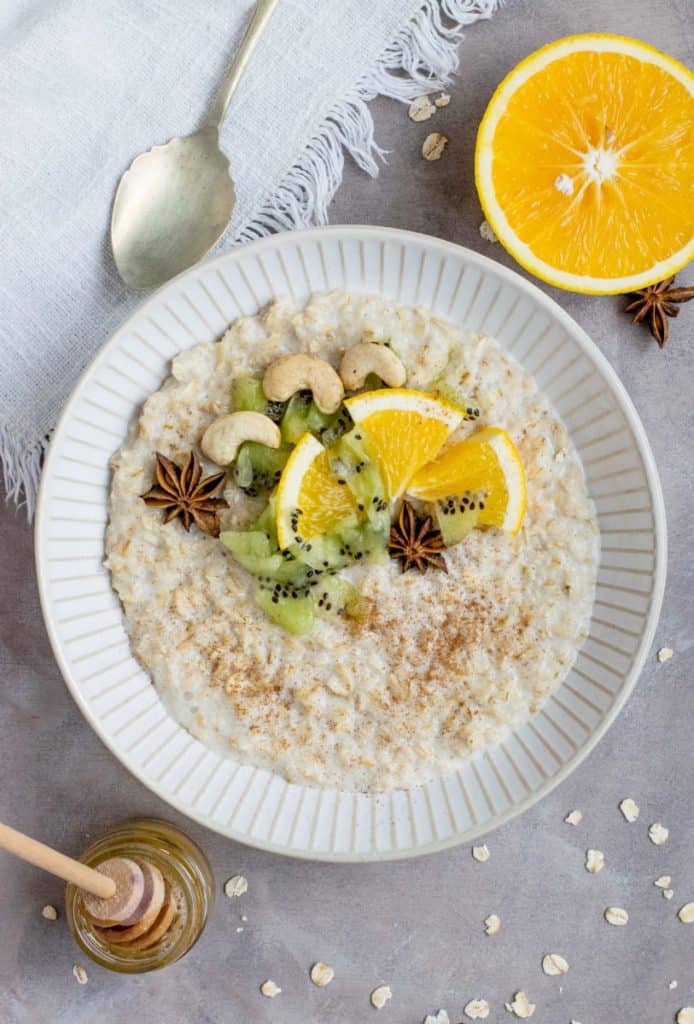
On top of that, oatmeal is simple to prepare and to take with you wherever you go for your fight. If you cook it through and only use water and/or nut milk it’s very easy to digest for your body. Since waiting for a fight is one of the most nerve wrecking things there is, eating easily digestible foods is an essential part of preparation. The last thing you want is indigestion or stomach cramps mixing up with the nerves in your belly.
What are good snacks for sports?
If you lack time for a proper meal prep, simply have some of the following sports nutrition snacks:
- Raw bar / energy bite
- Banana & peanut butter
- Almonds & apples
- Smoothie with fruit & vegetables
- Protein shake
- Nuts & dried fruit
- Dry roasted beans
- Wholegrain sourdough bread with avocado & nut butter
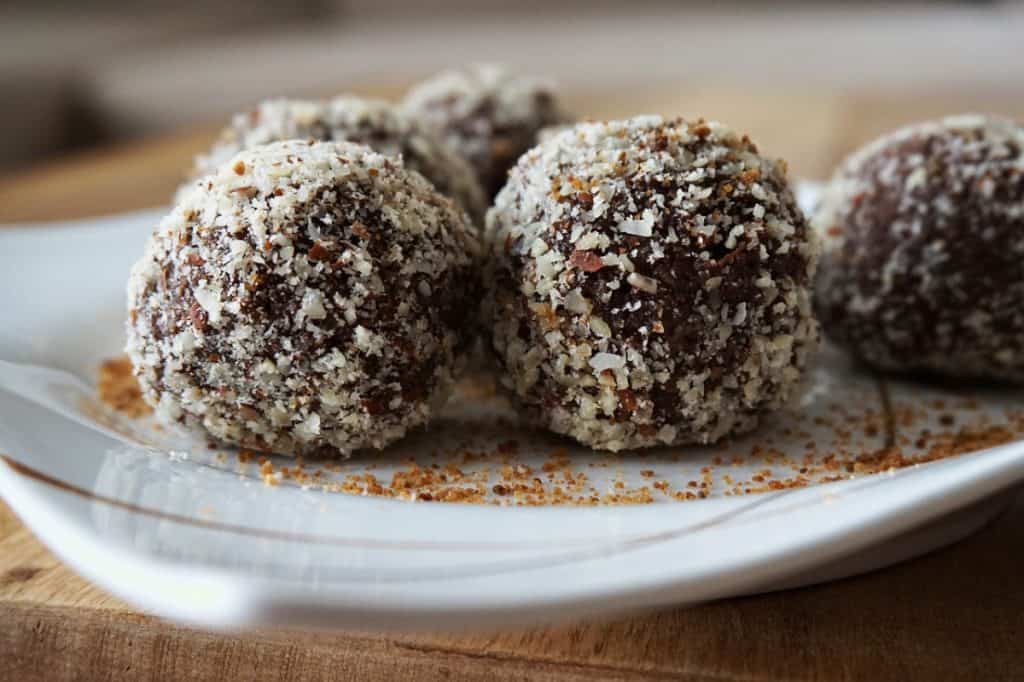
What do fighters do on fight day?
The day of fighting primarily consists of rituals (e.g. specific morning routines, meals, clothes, meditation, music) to get into the fighting and/or winning mindset, and of distractions from the event (walking around the city, joking around with friends) in order to contain the pre-fight nerves.
Pro-tip: if you don’t have anyone else to joke around with, find a mirror and make goofy and funny faces. Don’t worry about how crazy you’ll look – it’s all about stopping to take yourself too serious and having a laugh instead. Since fighting is such a risky and intense endeavor, you easily fall into the trap of taking yourself too serious – having a laugh about and with yourself helps you relax and be more comfortable with your nerves.
On fight day, all the heavy training and preparation is already done, so it’s all about getting your mind ready for fighting and preventing your nerves from getting the best of you. Hence, these ritualized activities and distractions from the actual fight itself. After that, there’s of course the warming up for the fight, and the final rituals culminating into the music guided walk-in to the ring or cage.
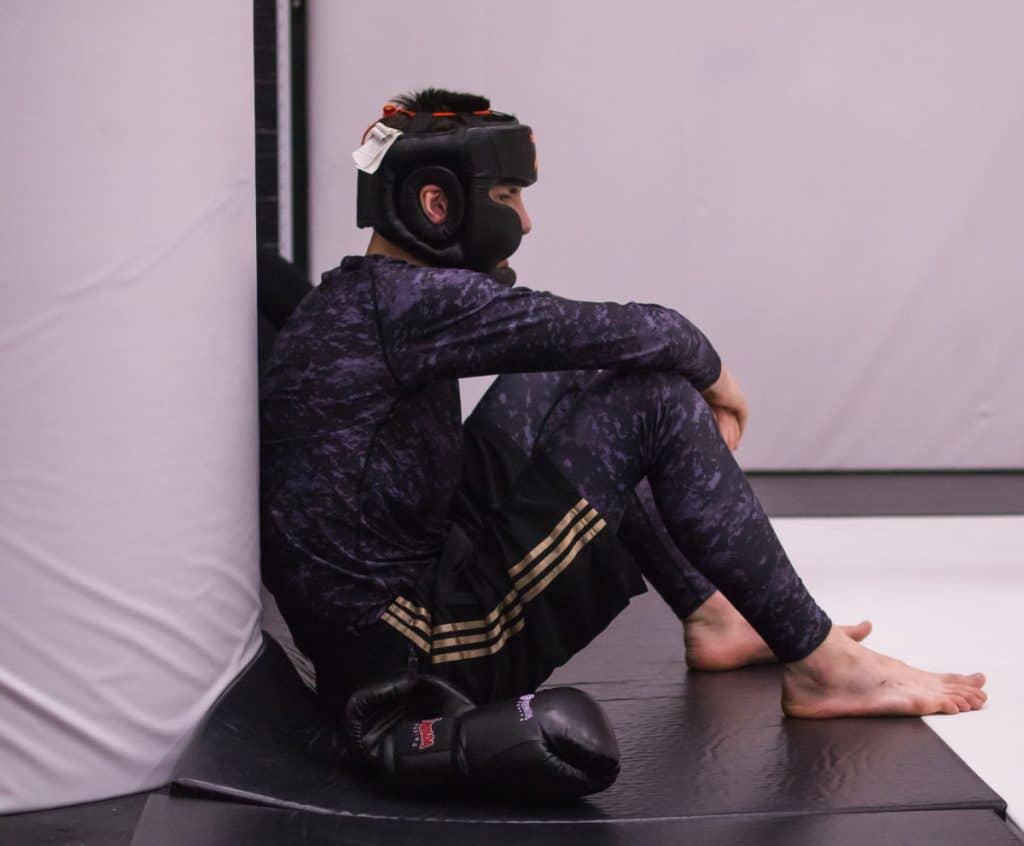
In order to train for the latter part – the rituals culminating in your walk-in – you can use meditation, specifically visualization. How meditation works and how you can built your own practice, I will detail in a later article. However, if you want to start now already, begin by planning a quiet moment – 5 minutes is a great start.
How do you meditate like a fighter?
Lay or sit comfortably and close your eyes so it’s easier to shift your focus inside. Begin with 5 deep breaths (6 seconds in, 6 seconds out) and then imagine – visualize – how your walk-in would look like: what will you wear? Who will you be with? What music will be playing? Which movements will you make? How will you enter the ring/cage? What will you do when you get inside?
You can even extend your visualization to the very start and until the very end of the fight, including all the good and all the tough moments. The more detailed you visualize them, the better.
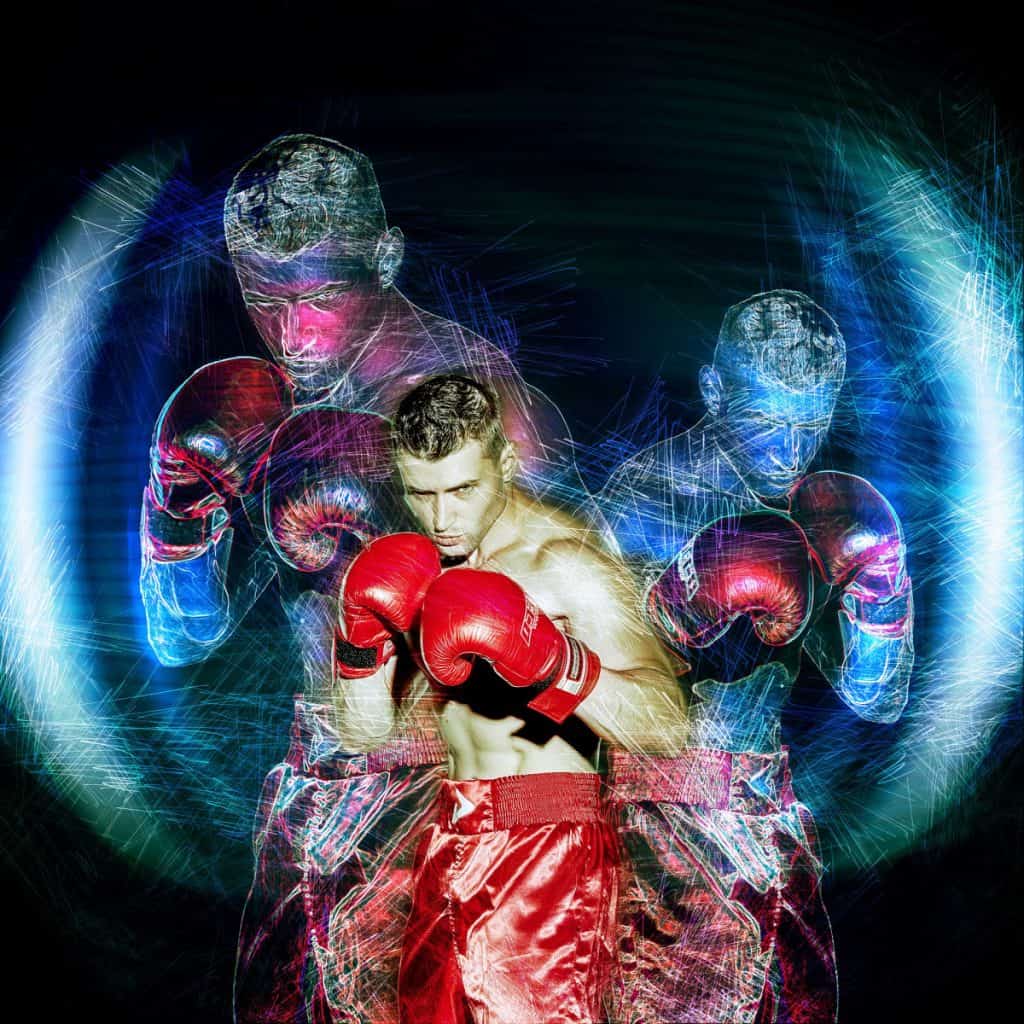
Visualization can get very intense – with your heart starting to race and sweat bursting out – but that’s exactly the point. By visualizing the (pre-) fighting event, your body can get familiar with the space, activity, and the emotions paired with them. This way, it’ll be less new (and thus less scary), meaning that it’s easier to be confident when you’re actually there. The more often you do this, the more detailed your visualizations will become and the more effective they will be. If you’re preparing for a fight, dedicate at least 1 moment a week to visualization.
Don’t obsess over it
The final element of pre-fight nutrition is not obsessing over it. As I wrote above, all the dieting, hard training, and preparation is already done before the fight – obsessing over your food won’t make it any better. Of course, that doesn’t mean that you should eat candy and junk food, but it means that you can perform just as well if you don’t adhere to all the guidelines or had a little less to eat than you’d ideally would have liked to.
UFC champion Rose Namajunas explained that her coach always tells her to just eat whatever she feels like on fight day (she’s a person who doesn’t like candy or junk food anyways). He explains that there are generally enough nutrients in your body from the day before, meaning that you’ll have plenty of energy available to fight. Moreover, if such a mindset helps to not stress (about your food) on fight day, you’ll have more energy left for the actual fight.
Recent Posts
The previous articles covered the foundation of fighting nutrition: the best pre- and post-workout meals, fight day nutrition, and what your everyday diet should include. This article will cover the...
Previous articles have discussed pre- and post-workout meals, fight day nutrition, and how to train without eating anything at all, so called “fasted workouts.” That means that there’s one...